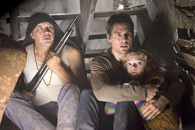
| Saturn Will Not Sleep - Discovery (Official Video) |

|
| home | movie reviews | features | sov horror | about | forum |
War of the Worlds C+
Year Released: 2005
"It's only in the face of horror that you truly find your noble self, and you can be so noble. So... I will bring you pain, I will bring you horror." Leave it to Steven Spielberg to turn the end of the world into a treatise on responsible parenting. War of the Worlds isn't the worst film on his resume, but it's a big step down from what he is capable of, mostly because -- yet again -- he cannot fully embrace the tale's inherent darkness. Of course, neither could H.G. Wells, who first penned the story, and who sullied its elegant irony with a shameless bit of melodrama in the postscript. Spielberg, too, has had trouble sticking the dismount of late, and here, I fear, he lets his humanistic instincts destroy what could have been an extraordinary film. Wells' novel was the first and last word on alien invasions, painting a bleak tale of Martian war machines that descend on Earth and lay waste to all before them. In conjuring those machines, Spielberg's effort fires on all cylinders. He perceives the horrors of Wells' text perfectly, even as he reimagines them for our post-9/11 sensibilities. The alien "tripods," which rise from the ground in horrid, Brobdingnagian glory, evoke the terrors of collapsing skyscrapers and enemies whose sole motivation is watching us die. When the film centers on their assault, and on the blind animal panic that they evoke in the populace, it becomes a thing of wonder. War of the Worlds is particularly well-served in retaining the tale's traditional first-person narrative: we see Armageddon from the point of view of an ordinary man, Ray Ferrier (Tom Cruise), and are guided almost solely by his perceptions, which makes them all the more terrifying. Glimpses of the devastation come in terrible/beautiful shorthand as only Spielberg can deliver: a train on fire, streaking madly through a small town crossing; human bodies floating almost serenely down a river; a moonlit woodland where ash and clothing rain down like snow. Spielberg should also be commended, at least early on, for keeping traditional protagonist heroics away from such scenes. Ray does his best under the circumstances, but at times, it's very apparent -- and fitting -- that he and his survive on pure dumb luck. The trouble arises when Spielberg attempts to marry the darker material with his standard "family in crisis" motif. Ray is posited as a divorced father whose journey through the increasingly hellish landscape includes his two children -- sullen teenager Robby (Justin Chatwin) and precocious moppet Rachel (Dakota Fanning) -- and is peppered with recurring moments of familiar dysfunction. The idea is to present the conflagration as a test of their bonds as a family, but when blended with the scenes of unimaginable destruction, it feels petty and narcissistic. Cruise struggles to sell us on the normality of his character; though he provides Ray with plenty of shortcomings (he's not a very good father, for starters), they fail to endear him to us, which makes his status as our eyes and ears harder to accept. More importantly, by focusing on the Ferriers as the sole figures of worth, we lose the horrifying impact of the Martians' attack. Their wanton destruction is chilling, to be sure, but it lacks emotional resonance, limited as it is to figures about whom we never care. With so much focus on Ray's family, nothing else seems important. That, presumably, is the point, but in the face of such cataclysmic imagery, we need to be invested in more than just these three people. The original text invoked the specter of future world wars, of cities reduced to rubble, of genocidal extermination at the hands of an uncaring foe. As we see it here, it feels like civilization must be destroyed just so Ray can realize the true meaning of fatherhood. That Spielberg may be too cuddly for this material is an obvious concern. But as parts of War of the Worlds prove, he possesses the ability to shake off the warm fuzzies and dive headlong into the abyss. Orson Welles -- whose take on the story was exceedingly grim and for whom its famous twist was almost an afterthought -- might have told him how to ply those depths to the bitter end. Had Spielberg emulated more of his predecessor's Halloween mischief, this might have been the definitive word on the definitive little green men story. Sadly, his crowd-pleasing instincts invade too much of the inky blackness, leaving War of the Worlds a powerful but fatally flawed near miss. Review published 06.28.2005.
|

|
| home | movie reviews | features | sov horror | about | forum |
| This site was previously at flipsidemovies.com from 2000 to 2008. |
|
contact | copyright | privacy | links | sitemap
Flipside Movie Emporium (FlipsideArchive.com)
|